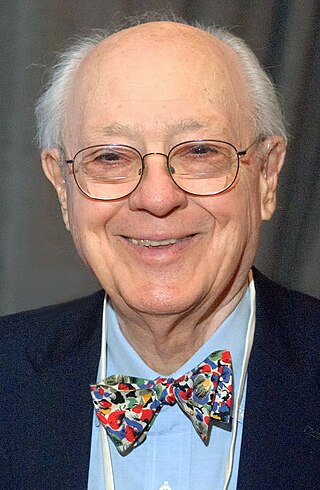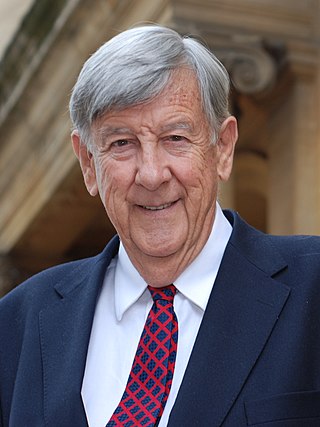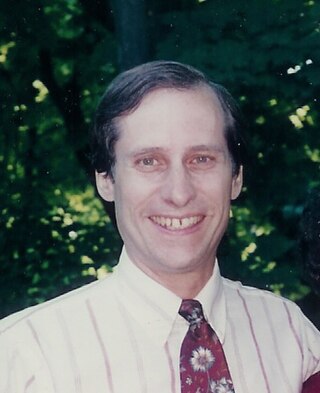Spaghetti code is a pejorative phrase for difficult-to-maintain and unstructured computer source code. Code being developed with poor structure can be due to any of several factors, such as volatile project requirements, lack of programming style rules, and software engineers with insufficient ability or experience.
In computer science, formal methods are mathematically rigorous techniques for the specification, development, analysis, and verification of software and hardware systems. The use of formal methods for software and hardware design is motivated by the expectation that, as in other engineering disciplines, performing appropriate mathematical analysis can contribute to the reliability and robustness of a design.
Michael Anthony Jackson is a British computer scientist, and independent computing consultant in London, England. He is also a visiting research professor at the Open University in the UK.

Charles William Bachman III was an American computer scientist, who spent his entire career as an industrial researcher, developer, and manager rather than in academia. He was particularly known for his work in the early development of database management systems. His techniques of layered architecture include his namesake Bachman diagrams.

Sir Syed University of Engineering and Technology is a private research university located in the urban area of Karachi, Sindh, Pakistan. The university is honored in the name of notable 19th-century Indian Muslim reformer and philosopher, Sir Syed Ahmad Khan.
Peter Pin-Shan Chen is a Taiwanese-American computer scientist. He is a (retired) distinguished career scientist and faculty member at Carnegie Mellon University and Distinguished Chair Professor Emeritus at LSU. He is known for the development of the entity–relationship model in 1976.
GXL is designed to be a standard exchange format for graphs. GXL is an extensible markup language (XML) sublanguage and the syntax is given by an XML document type definition (DTD). This exchange format offers an adaptable and flexible means to support interoperability between graph-based tools.

James Martin was an English information technology consultant and author, known for his work on information technology engineering.

Clifford "Cliff" B. Jones is a British computer scientist, specializing in research into formal methods. He undertook a late DPhil at the Oxford University Computing Laboratory under Tony Hoare, awarded in 1981. Jones' thesis proposed an extension to Hoare logic for handling concurrent programs, rely/guarantee.
Rigi is an interactive graph editor tool for software reverse engineering using the white box method, i.e. necessitating source code, thus it is mainly aimed at program comprehension. Rigi is distributed by its main author, Hausi A. Müller and the Rigi research group at the University of Victoria.

Wayne P. Stevens was an American software engineer, consultant, author, pioneer, and advocate of the practical application of software methods and tools.
Steven Gregory Woods is a Canadian entrepreneur. He is best known for co-founding Quack.com, the first popular Voice portal platform, in 1998. Woods became the head of engineering for Google Canada where he was until 2021, when he joined Canadian Venture capital firm iNovia Capital as partner and CTO, following in the footsteps of Patrick Pichette, Google's CFO who also joined iNovia after leaving Google.
The Bauhaus project is a software research project collaboration among the University of Stuttgart, the University of Bremen, and a commercial spin-off company Axivion, also known as Bauhaus Software Technologies.

Joseph Brant Arseneau is an entrepreneur and executive, best known for his work in both fintech and space technology. He is generally known in finance for his work in Electronic Trading, Renewable Energy Derivatives, and Capital Markets technology. He has been both a chief information officer (CIO) for large banks and an entrepreneur, having started several fintech start-ups. Arseneau has moved into the NewSpace industry and is currently a founding partner at 9Point8 Capital and a founder of Spaced Ventures.

Peter William O'Hearn, formerly a research scientist at Meta, is a Distinguished Engineer at Lacework and a Professor of Computer science at University College London (UCL). He has made significant contributions to formal methods for program correctness. In recent years these advances have been employed in developing industrial software tools that conduct automated analysis of large industrial codebases.
CL-HTTP is a web server, client and proxy written in Common Lisp. It is based on its own web application framework. It was written by John C. Mallery "in about 10 days" starting in 1994 on a Symbolics Lisp Machine. In the same year a port to Macintosh Common Lisp was done. In 1996 CL-HTTP became the first web server to support the HTTP 1.1 protocol. It runs on Unix, Linux, BSD variants, Mac OS X, Solaris, Symbolics Genera and Microsoft Windows.

Anthony "Tony" I. Wasserman, is an American computer scientist. He is a member of the board of directors of the Open Source Initiative, was a professor of the Practice in Software Management at Carnegie Mellon Silicon Valley, and is executive director of the CMU Center for Open Source Investigation. He has been a SkyDeck accelerator program advisor at University of California, Berkeley since 2021.
Software diagnosis refers to concepts, techniques, and tools that allow for obtaining findings, conclusions, and evaluations about software systems and their implementation, composition, behaviour, and evolution. It serves as means to monitor, steer, observe and optimize software development, software maintenance, and software re-engineering in the sense of a business intelligence approach specific to software systems. It is generally based on the automatic extraction, analysis, and visualization of corresponding information sources of the software system. It can also be manually done and not automatic.
Philip H. Newcomb is an American software engineer and CEO of The Software Revolution, Inc., known for his work in the field of formal methods of software engineering.
SimScale is a computer-aided engineering (CAE) software product based on cloud computing. SimScale was developed by SimScale GmbH and allows computational fluid dynamics, finite element analysis and thermal simulations. The backend of the platform uses open source and proprietary simulation codes. The open source codes include:







